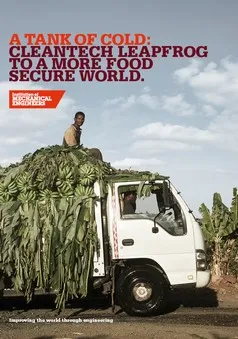This report from the Institution for Mechanical Engineers discusses the role that cold chain technologies can play in improving food security in developing countries. It argues that we need to address the question of how we can achieve sustainable food security and not just increased production.

It states that there is also a need to address food waste, the food that is either ‘lost’ within the food supply system, or is discarded in the marketplace or home as ‘waste’ as a result of societal and consumerist behaviour.
Cold is the key to tackling the loss of perishable produce. In this regard, it is estimated that around a quarter of total food wastage in developing countries could be eliminated if these countries adopted the same level of refrigeration equipment as that in developed economies. Thus, establishing a continuous chain of temperature-controlled cold environments from the point of harvest to the marketplace and on into the home – a ‘cold chain’ – is required. The IEA predicts that by 2035 energy demand globally will increase by 40%, and 90% of this growth will be from non-OECD countries. Finding a sustainable solution to meet the energy security needs of cold chain technologies is therefore argues by the report authors as crucial to aid international development and help deliver a more food-secure world. This they say, will not only lead to a reduction in post-harvest losses, but also has the potential to avoid additional harmful emissions of air pollutants.
The report argues that connecting local farmers with higher-value market options locally, nationally and internationally through cold chains (in a manner that minimises food wastage, is sustainable and avoids harmful emissions and air pollutants) is a challenge for the engineering profession and this report is dedicated to explore options and it proposes a range of energy storage solutions that meet the criteria for use in the context of a developing economy, and are either commercially available today, or in development and close to market.
Download the full report here.
Read more about technology options here and more on technology focused on energy efficiency here.
For the FCRN’s own work on refrigeration, you may be interested in this report here which takes a slightly different approach to the issues. It provides an estimate of UK food-related GHG emissions but also acknowledging that refrigeration plays a part in helping avoid food waste and associated emissions. However it goes a bit further than this to show that as a society, we are now dependent on the cold chain, and this has consequences. It explores the societal and technical influences on our refrigeration dependence in the UK – these include the development of the motorway network enabling long distant transport, widespread central heating, the microwave, rising female employment and affluence. It shows that food refrigeration is intrinsically linked to other technologies and cultural practices that are also, in themselves, energy intensive. The interactions among refrigeration, packaging, food transport, food product innovations and various socio-economic developments have helped create cultural norms and practices that are highly energy dependent. Technology and behaviour thus feed one another.
As such, refrigeration serves as a symbol, or marker of unsustainable energy use and unsustainable behaviours in the food system. Policies need to address, therefore, not just refrigeration energy use, but also refrigeration dependence. While energy efficiency measures and novel technologies are important – indeed essential – they do not tackle the reasons why we need to use refrigeration (i.e. what it is about the foods we eat and the way we manage our lives that renders refrigeration necessary?); nor how refrigeration has catalysed additional developments in the food supply chain
that have damaging consequences for greenhouse gas emissions.
You can download the paper here and a shorter paper can be found here.




Comments (0)